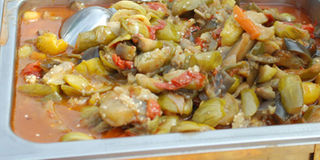Prime
Entula, the bitter medicinal garden eggs to boost meals

Entula is often prepared with other foods such as aubergines like above. Photos by Ismail Kezaala
What you need to know:
In the past, entula or garden eggs were popular as a medicinal vegetable, however today, it is eaten as a component of other foods more for its nutritional value.
The Thai round eggplant or garden eggs, locally called entula by Bantu speakers, may not be able to stand alone as a meal, but nonetheless is a popular delicacy that makes other foods tasty.
These usually green oval or cream bulb vegetables are often eaten as components of a bigger meal because of their bitter taste. This bitterness though, Mariam Nabyesero, a restaurant owner in Nakasero market argues, is often perceived and not real. “Most customers prefer to eat it with other foods.
It works best for them as a side dish accompanying fish, beans, cabbage and meat, depending on one’s choice,” the 49-year-old says. However, if well-cooked, entula can be such a delicacy even on its own. “It can come out well and be eaten independently with posho, potatoes, rice and even kalo (millet bread).” She adds that because of the tendency to prepare and eat entula as a side-dish, many have not ventured into things like pasting entula sauce with groundnut paste which actually makes it more delicious.
However, 53-year-old Damian Sekabira, a vegetable farmer in Kikaya, a Kampala suburb simply laughs at those who write off entula as a bitter sauce and relegate it to the side-dishes. He shares that in the past, entula was a purely medicinal vegetable. His peers he says attach more medicinal value to it than this nutritious aspect of today. “Our fore-fathers ate entula for purely curative reasons and the proteins, carbohydrates and vitamins we cherish today came as a matter of coincidence. May be its bitterness was naturally designed for medicinal purposes,” he argues.
Dr Grace Nambatya Kyeyune, a food researcher and scientist in a recent interview with one of the vernacular dailies, was quoted saying, “entula has several healing functions to the human body.” According to Sekabira, all you have to do is peel it thoroughly and squeeze the juice out and sip it. The soup from entula is also said to be a remedy for sore throat.
“The entula is cooked (read boiled), allowed to cool down and the soup drunk gently, just like how you drink tea.
As it slowly moves down the throat, it works on the throat sores and redeems you from the pain shortly after,” Sekabira’s wife Joan says. Alternatively, entula roots can be thoroughly washed and chewed. The juice makes a remarkable difference in the throat. If chewing the roots comes off as old fashioned and difficult, then the roots can also be boiled.
The soup obtained after is drunk to relieve back, chest and general body pain. She adds that few decades ago, children with worm infections were fed on a pure entula diet till they healed.
For those with toothache, the soup from entula instantly relieves the pain when it lands on the affected or aching tooth region.
=========================================
Great for your health
The garden egg, also known as eggplant is a very good source of dietary fiber, potassium, manganese, copper and thiamin (vitamin B1). It is also a good source of vitamin B6, folate, magnesium and niacin. Eggplant also contains phytonutrients such as nasunin and chlorogenic acid.
The benefits of eating garden eggs however extend far beyond ensuring that one’s desire for a good meal is satisfied. Low in calories and high in fibre, the eggplant is good for carbohydrate counters and dieters can actually snack on garden eggs in-between meals.
Chewing thoroughly while eating, can enable you get significant benefits, including absorption of calcium, from calcium-rich foods plant foods that also contain oxalic acid. So, eating garden eggs does not stop you from meeting your calcium requirements.
Experts are encouraging people that wants to loss weight to eat more of its fresh form too.
Consuming high amounts of garden eggs have been found to be beneficial for people with glaucoma because it lowers the eye pressure.
Eggplant contains measurable amounts of oxalates which are naturally-occurring substances found in plants, animals, and human beings. When oxalates become too concentrated in body fluids, they can crystallise and cause health problems




